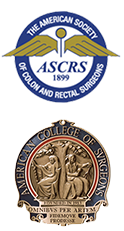Hereditary Non-Polyposis Colorectal Cancer (HNPCC)
HNPCC, also known as Lynch syndrome, is an inherited condition that increases an individual’s risk of developing colorectal cancer. The term “non-polyposis” refers to a relative lack or small number of polyps present within the colon, as opposed to the greater number found with the other inherited cancer syndromes (for example, Familial Adenomatous Polyposis). Hereditary nonpolyposis colorectal cancer (HNPCC) syndrome was first described over 100 years ago. It is one of the more common inherited colorectal cancer syndromes and is estimated to be responsible for between 0.5-6% of all colorectal cancers. Families affected by HNPCC have members that develop colorectal cancer at an early age (usually in their 30s or 40s), often have right-sided colon cancers and may develop multiple cancers. Some of the other organs found to be at risk include the ovaries, uterus, stomach, small bowel, urinary tract and bile ducts.
Inheritence
HNPCC is an autosomal dominant condition – this means that a parent with the disease has a 50% chance of passing it to his/her children. The gene mutation can be passed on even if the parent has had surgery to remove his or her own colon. Genetic testing is available to see if an individual carries one of the common genes responsible for HNPCCC. If an individual does not have this gene, their children are not at risk for HNPCC. Therefore, the family member with cancer and suspicion for HNPCC should be the first person in the family to consider testing.
Genetic Counseling
Genetic counseling is an important aspect of understanding your risk and deciding on whether or not to pursue genetic testing. Genetic counselors are specialized in explaining HNPCC and other inherited disorders, uncovering which family members are at risk and discussing the pros and cons of genetic testing. We work closely with accomplished genetic counselor and will provide referrals as appropriate.
Screening
Early diagnosis is important for the early detection and prevention of cancer. Regular screening should start at the ages described in the exam guidelines below. When colorectal cancer is detected early, the chance of cure is much better.
Several guidelines have been developed to help identify individuals who may have this syndrome – one guideline, the Revised Bethesda Guidelines, looks for the following occurrences:
- Colorectal cancer diagnosed in a patient under the age of 50
- Presence of a second cancer (either another colorectal cancer or one of the associated cancers listed above) at the same time or within six months of initial diagnosis
- MSI-H histology (our pathologists examine all colorectal tumor specimens for this property) diagnosed in a patient under the age of 60
- Colorectal cancer diagnosed in a first-degree relative (parent, sibling, child) who also has an associated cancer if either one of these cancers developed below the age of 50
- Colorectal cancer diagnosed in two or more first- or second-degree who also have an associated cancer regardless of age of diagnosis
Screening guidelines in at risk families who have not undergone genetic testing:
- Colonoscopy every 1–2 years starting by age 25 years or 10 years before the age of earliest colorectal cancer diagnosed in the family, whichever is younger.
- At age 40 begin annual colonoscopy.
- Women should undergo yearly pelvic exam, Pap test and transvaginal ultrasound beginning at age 25.
- Consider annual upper endoscopy in families with gastric cancer.
The key to success when dealing with a possible risk for an inherited cancer syndrome is early diagnosis, aggressive surveillance and the proper timing and selection of a surgical intervention when needed. If you are concerned for yourself or a family member, please contact our office to discuss your specific situation.





